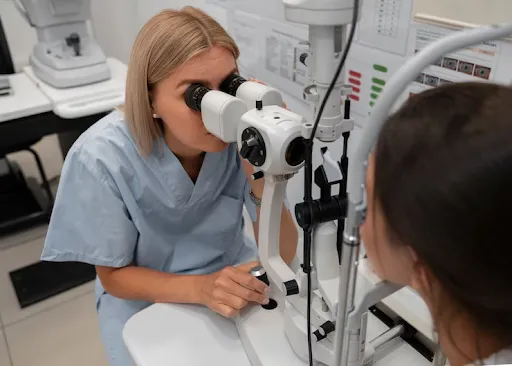Diabetic Eye Care
Understanding Diabetes and Vision Health
FSDAVCFEBFEVSDDVFSD
FSDAVCFEBFEVSDDVFSD
FSDAVCFEBFEVSDDVFSD
How Diabetes Affects the Eyes
Diabetes can significantly impact eye health, often leading to vision-threatening conditions if not managed properly. A common complication is diabetic retinopathy, where high blood sugar damages the blood vessels in the retina, causing them to leak or become blocked. This can result in vision problems, and if untreated, it may lead to severe vision loss.
In addition to diabetic retinopathy, individuals with diabetes are at higher risk for glaucoma and cataracts. Glaucoma involves increased eye pressure that damages the optic nerve, while cataracts cause clouding of the eye’s lens, leading to blurred vision. Since these conditions may develop silently, regular eye exams are crucial for early detection and timely treatment.
Diabetes can significantly impact eye health, often leading to vision-threatening conditions if not managed properly. A common complication is diabetic retinopathy, where high blood sugar damages the blood vessels in the retina, causing them to leak or become blocked. This can result in vision problems, and if untreated, it may lead to severe vision loss.

In addition to diabetic retinopathy, individuals with diabetes are at higher risk for glaucoma and cataracts. Glaucoma involves increased eye pressure that damages the optic nerve, while cataracts cause clouding of the eye’s lens, leading to blurred vision. Since these conditions may develop silently, regular eye exams are crucial for early detection and timely treatment.

Recognizing Diabetic Retinopathy
Diabetic retinopathy develops in stages, starting with mild changes and potentially advancing to proliferative retinopathy, where abnormal blood vessels form on the retina. Early stages often lack symptoms, highlighting the Importance of Regular Eye Exams for Diabetics to detect issues early. As it progresses, symptoms like blurred vision, floaters, impaired color vision, or vision loss may occur without timely intervention.
A significant complication of diabetic retinopathy is diabetic macular edema (DME), which occurs when fluid accumulates in the macula—the part of the retina responsible for sharp, central vision. DME can develop at any stage of diabetic retinopathy and is one of the leading causes of vision loss in people with diabetes. This condition may manifest with symptoms like distorted or blurred central vision, severely impacting daily activities such as reading and driving.
Early detection of diabetic retinopathy and DME is crucial to prevent irreversible damage. Regular comprehensive eye exams can identify these conditions in their initial stages, allowing for timely intervention. Treatment options, including laser therapy, medications, or surgery, can help slow or halt the progression of vision loss, preserving sight and improving the quality of life for individuals with diabetes.
Importance of Regular Eye Exams

Annual comprehensive dilated eye exams are crucial for individuals with diabetes to preserve vision and maintain eye health. A Diabetic Eye Exam enables eye care professionals to detect early signs of diabetic retinopathy and other diabetes-related eye conditions, often before noticeable symptoms develop. By dilating the pupils, the retina and optic nerve can be closely examined, allowing for the identification of subtle changes that might indicate the onset of complications.

Early detection through regular eye exams greatly enhances the effectiveness of treatments like laser therapy, injections, or surgery, helping to prevent or delay vision loss. Addressing these conditions at an early stage reduces the risk of severe complications, ensuring better outcomes. Incorporating routine eye examinations into diabetes management is a proactive and vital approach to safeguarding vision and improving the quality of life for individuals living with diabetes.
In addition to regular eye exams, managing blood sugar levels, blood pressure, and cholesterol is critical for preserving eye health in individuals with diabetes. These factors are closely linked to the development and progression of diabetic eye diseases, including retinopathy and macular edema. Consistently maintaining blood sugar within target ranges reduces the strain on blood vessels in the retina, while controlling blood pressure and cholesterol supports overall vascular health, minimizing the risk of complications.
Lifestyle choices also play a vital role in maintaining eye health. A balanced diet rich in fruits, vegetables, whole grains, and omega-3 fatty acids provides essential nutrients that support retinal function and combat oxidative stress. Regular physical activity improves blood circulation and helps regulate blood sugar levels, further reducing the risk of eye complications. By combining healthy habits with proper medical management, individuals with diabetes can significantly lower their chances of developing vision-threatening conditions, ensuring better long-term eye health and quality of life.
Managing Eye Health with Diabetes
Effective diabetes management is essential for preserving eye health and preventing complications. Key strategies include maintaining blood sugar levels within target ranges, controlling blood pressure and cholesterol, and adopting a balanced diet rich in nutrients. Proper blood sugar control reduces stress on the retina's blood vessels, while managing blood pressure and cholesterol promotes overall vascular health, reducing the likelihood of diabetic retinopathy and other eye conditions. A diet high in antioxidants, vitamins, and omega-3 fatty acids supports retinal health and combats oxidative damage.
Incorporating regular physical activity, avoiding smoking, and working closely with healthcare providers are equally important. Exercise improves blood circulation, helps regulate blood sugar, and reduces inflammation, while avoiding smoking decreases the risk of vascular damage that can affect the eyes. A personalized diabetes management plan that includes these measures ensures both systemic and ocular health, lowering the risk of vision loss and enhancing overall well-being for individuals with diabetes.
Treatment Options for Diabetic Eye Conditions
When diabetic eye conditions are detected, several treatment options are available to manage and reduce the risk of vision loss. Laser therapy is commonly used to seal leaking blood vessels and reduce swelling in the retina, effectively slowing the progression of diabetic retinopathy and macular edema. This minimally invasive procedure can help stabilize vision in many cases.
Anti-VEGF injections are another effective treatment, where medications are injected into the eye to block the growth of abnormal blood vessels. These injections can significantly reduce the risk of further damage caused by proliferative diabetic retinopathy or diabetic macular edema.
When diabetic eye conditions are detected, several treatment options are available to manage and reduce the risk of vision loss. Laser therapy is commonly used to seal leaking blood vessels and reduce swelling in the retina, effectively slowing the progression of diabetic retinopathy and macular edema. This minimally invasive procedure can help stabilize vision in many cases.
Anti-VEGF injections are another effective treatment, where medications are injected into the eye to block the growth of abnormal blood vessels. These injections can significantly reduce the risk of further damage caused by proliferative diabetic retinopathy or diabetic macular edema.


In more advanced cases, vitrectomy surgery may be necessary to remove blood or scar tissue from the vitreous gel inside the eye. Early intervention and regular monitoring are critical for achieving better outcomes and preserving vision.
Preventive Measures and Lifestyle Adjustments
Preventing diabetic eye diseases requires a proactive approach that combines regular medical care with healthy lifestyle choices. One of the most important steps is scheduling annual comprehensive dilated eye exams. These exams allow eye care professionals to detect early signs of diabetic retinopathy, diabetic macular edema, and other eye conditions, often before symptoms arise. Early detection enables timely intervention, which can prevent or slow vision loss.
Effective blood sugar management is another critical component of prevention. Keeping blood glucose levels within the recommended range reduces the strain on the blood vessels in the retina, lowering the risk of damage. Blood sugar control not only helps in preventing diabetic eye diseases but also supports overall health by minimizing other diabetes-related complications.
A balanced diet rich in fruits, vegetables, whole grains, and healthy fats provides essential nutrients that support eye health and combat oxidative stress. Foods high in antioxidants, such as leafy greens and citrus fruits, are particularly beneficial. Regular physical activity complements a healthy diet by improving blood circulation, regulating blood sugar levels, and lowering blood pressure—all of which contribute to reducing the risk of eye complications.
Avoiding smoking is equally important, as smoking increases the risk of vascular damage and exacerbates diabetic complications, including those affecting the eyes. By combining these preventive measures—regular eye exams, blood sugar management, a nutritious diet, physical activity, and avoiding smoking—individuals with diabetes can significantly lower their chances of developing diabetic eye conditions. These steps not only protect vision but also contribute to overall well-being, emphasizing the importance of a holistic approach to diabetes management.
Understanding the Risks
Diabetic eye diseases are a leading cause of vision loss among adults, making it crucial to understand the risks associated with diabetes and eye health. One significant factor is the duration of diabetes—individuals who have lived with diabetes for many years face a higher risk of developing complications such as diabetic retinopathy and macular edema. The cumulative damage to blood vessels over time underscores the need for early and consistent management of the condition.

Diabetic eye diseases are a leading cause of vision loss among adults, making it crucial to understand the risks associated with diabetes and eye health. One significant factor is the duration of diabetes—individuals who have lived with diabetes for many years face a higher risk of developing complications such as diabetic retinopathy and macular edema. The cumulative damage to blood vessels over time underscores the need for early and consistent management of the condition.
Poor blood sugar control is another major risk factor. Prolonged periods of high blood sugar levels can damage the delicate blood vessels in the retina, leading to vision-threatening complications. Maintaining blood sugar within recommended ranges is essential to reduce this risk and protect eye health.
Poor blood sugar control is another major risk factor. Prolonged periods of high blood sugar levels can damage the delicate blood vessels in the retina, leading to vision-threatening complications. Maintaining blood sugar within recommended ranges is essential to reduce this risk and protect eye health.
Additionally, high blood pressure and cholesterol can exacerbate the progression of diabetic eye diseases by further damaging retinal blood vessels. Comprehensive diabetes management, combined with regular eye care, is key to mitigating these risks and preserving vision.
Taking Proactive Steps
Proactive diabetes and eye health management involves working closely with healthcare providers and following treatment plans. Regular communication with your eye care professional is essential to monitor vision changes and catch issues early. Comprehensive dilated eye exams can detect conditions like retinopathy and macular edema before symptoms appear. For expert diabetic eye care and early detection, Contact Kleinwood Vision today.
Early detection and treatment of diabetic eye diseases can significantly prevent or delay vision loss. Alongside regular eye exams, managing blood sugar levels, blood pressure, and cholesterol is crucial for protecting eye health. Adopting a balanced diet, engaging in regular physical activity, and avoiding smoking are also important lifestyle changes that support overall well-being. By following these proactive steps, individuals with diabetes can reduce the risk of eye complications, preserve their vision, and improve their quality of life. Regular eye care and consistent diabetes management are essential for long-term health.

Contact Info
Hours of Operation
Mon - Fri | 9:00 AM - 5:00 PM
Sat - Sun | Closed
Holiday Hours: We are closed for the following holidays: New Years Day, Memorial Day, Independence Day, Labor Day, Thanksgiving Day, Christmas Day
© 2026 Kleinwood Vision. All rights Reserved.


